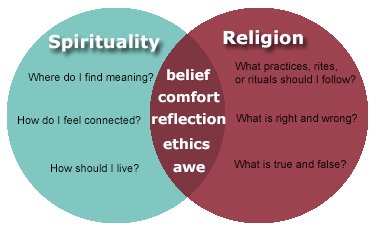The meaning of spirituality has developed and expanded over time, and various connotations can be found alongside each other.
Traditionally, spirituality referred to a religious process of re-formation which “aims to recover the original shape of man”, oriented at “the image of God” as exemplified by the founders and sacred texts of the religions of the world. The term was used within early Christianity to refer to a life oriented toward the Holy Spirit and broadened during the Late Middle Ages to include mental aspects of life.
In modern times, the term both spread to other religious traditions and broadened to refer to a wider range of experience, including a range of esoteric traditions and religious traditions. Modern usages tend to refer to a subjective experience of a sacred dimension and the “deepest values and meanings by which people live”, often in a context separate from organized religious institutions, such as a belief in a supernatural (beyond the known and observable) realm, personal growth, a quest for an ultimate or sacred meaning, religious experience, or an encounter with one’s own “inner dimension”
Spirituality is a broad concept with room for many perspectives. In general, it includes a sense of connection to something bigger than ourselves, and it typically involves a search for meaning in life. As such, it is a universal human experience something that touches us all. People may describe a spiritual experience as sacred or transcendent or simply a deep sense of aliveness and interconnectedness.
Some may find that their spiritual life is intricately linked to their association with a church, temple, mosque, or synagogue. Others may pray or find comfort in a personal relationship with God or a higher power. Still others seek meaning through their connections to nature or art. Like your sense of purpose, your personal definition of spirituality may change throughout your life, adapting to your own experiences and relationships.
Experts’ definitions of spirituality
Christina Puchalski, MD, Director of the George Washington Institute for Spirituality and Health, contends that “spirituality is the aspect of humanity that refers to the way individuals seek and express meaning and purpose and the way they experience their connectedness to the moment, to self, to others, to nature, and to the significant or sacred.”
According to Mario Beauregard and Denyse O’Leary, researchers and authors of The Spiritual Brain, “spirituality means any experience that is thought to bring the experiencer into contact with the divine (in other words, not just any experience that feels meaningful).”
Nurses Ruth Beckmann Murray and Judith Proctor Zenter write that “the spiritual dimension tries to be in harmony with the universe, and strives for answers about the infinite, and comes into focus when the person faces emotional stress, physical illness, or death.”
Relationship between Religion and Spirituality
While spirituality may incorporate elements of religion, it is generally a broader concept. Religion and spirituality are not the same thing, nor are they entirely distinct from one another. The best way to understand this is to think of two overlapping circles like this:

Venn diagram of religion and spirituality
In spirituality, the questions are: where do I personally find meaning, connection, and value?
In religion, the questions are: what is true and right?
Where the circles overlap is the individual experience, which affects the way you think, feel, and behave.